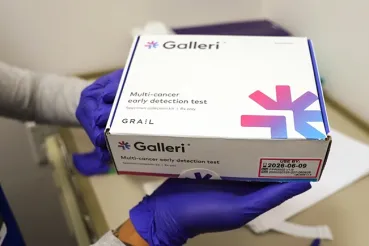When Sumita Bhatia, MD, began practicing radiation oncology, she felt something was missing.
“I felt like we were not addressing the whole person,” she says. That’s why integrative medicine is now one of her passions. A radiation oncologist at RUSH Copley Cancer Care Center, her goal is to use her expertise and her knowledge of integrated medicine to treat the whole patient.
What is integrative medicine?
Integrative medicine is a combination of traditional treatment, like surgery, radiation and chemotherapy, with mind-body approaches, such as nutrition, yoga and mindfulness, that help patients manage their emotions.
“When I started pursuing a fellowship in integrative medicine, it really opened my eyes to how important and healing this is for patients,” she says.
When she consults with patients, she talks about their treatment but also asks them about things like their diet and sleep habits. She encourages nutrition counseling through RUSH Copley’s nutrition program as well as therapies that promote relaxation, which are offered by Waterford Place Cancer Resource Center.
“By this approach, I have seen very positive results in my patients,” she says. “We are not only helping treat and cure the cancer, we are also creating lifestyle changes for the patient.”
Lessening anxiety
When patients come to her for radiation — which to them is an unfamiliar, scary experience — she tries to lessen their anxiety by explaining the procedure and how it works so they know what to expect. In addition, she offers them integrative therapies to get them through the procedure.
For some patients, it is difficult to lie still on the table for 20 to 30 minutes, so she uses guided visualization or deep breathing to help calm their minds. She uses other guided meditations as well, encouraging patients to think of the treatment center as a healing space, much like a womb. She also finds that essential oils are calming and can decrease a patient’s anxiety.
“I have seen a transformation in my patients,” she says. “They are not as stressed. They didn’t have these tools before.”
Bhatia finds that the combination of integrative medicine with traditional radiation therapy is better for her patients and their recovery. It decreases the effects of stress on the body and mind and helps them deal with side effects from treatment.
Caring for the whole patient
“What happens is when the person goes home, they are in a better environment to fight their cancer,” she explains.
Bhatia uses integrative therapies to help her patients to go through their treatment with grace, healing and nurturing, not fear. Approaching their cancer from this perspective is better for their nervous system and creates less inflammation in the body, she explains.
“I want to be a guide for patients as they go through their cancer journey,” she says. “And I want to be able to use all of the tools I have to provide them the best care possible — all of my expertise and knowledge in radiation oncology as well as all of the skill sets and information I have in integrative medicine to treat the whole patient.”




